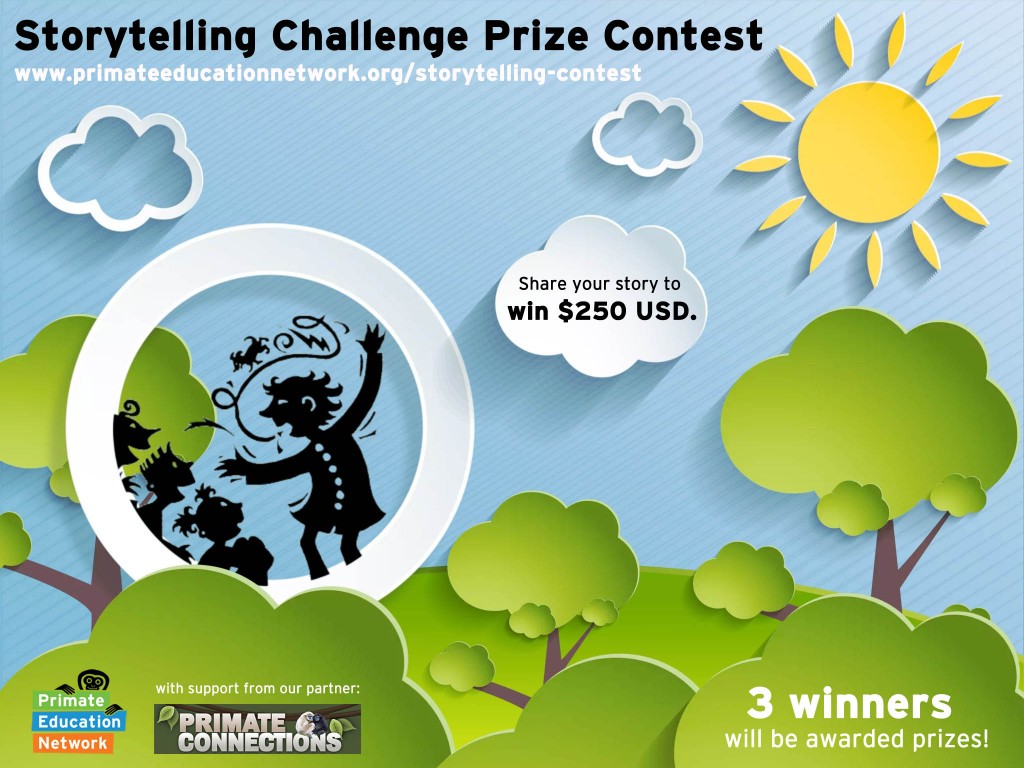Do you use powerful and persuasive stories to change hearts and minds?
It's International Primate Day! Celebrate with PEN's global community of primate conservation educators by entering our Storytelling Challenge Prize Contest.
The purpose of PEN’s contest is to collect traditional and modern/contemporary stories with a primate component. PEN is looking for successes in applying the art of storytelling to positively influence knowledge, attitudes, and behavior of communities in primate range countries. Educators and practitioners will benefit from the results of our contest by learning from each other’s experiences and successes in using storytelling as an effective tool for education.
PEN will select three organizations working in Latin America, Africa, and Asia to receive $250 USD in cash prizes (with support from our partner Primate Connections) as a reward for sharing their stories.
What is Storytelling?
Storytelling is a universal art form that conveys events by using words, sounds, and/or images. Traditional stories or narratives have been used for thousands of years across civilizations to pass down knowledge and values from generation to generation. Modern or contemporary stories are from the present or recent time as opposed to the remote past. Both types of stories can be oral, written, visual, or enacted through drama, music, dance, comedy, puppetry, poetry, and other forms of expression. Forms of storytelling include: fairytales, folktales, mythology, legends, fables, and factual.
Storytelling is an Educational Tool
Storytelling is the oldest form of education. Did you know that our brains are wired to learn from and enjoy stories? The emotional and cognitive effects of a story generate greater empathy and influence our beliefs, attitudes, and real-world decisions. This is why storytelling is an effective tool to teach lessons about ethics, values, and cultural norms.
Storytelling is a transformational experience that engages audiences of all ages in problem solving. Audiences can participate by asking questions, acting out a story, or telling smaller parts of the story. These participatory experiences can result in improved focus and retention of the story’s messages. The best stories captivate audiences and link their emotions to the characters. They are interactive, memorable, and actionable.
Contest Details:
- Contest Deadline: Applicants must submit the below online form by September 22, 2015. Interviews will be conducted until September 30, 2015.
- Eligibility: To be eligible for our contest, you must become a PEN member.
- Cash Prizes: PEN will select three prize finalists. Each finalist will receive $250 USD and be featured in PEN’s news and social media. If awarded a prize, you must commit to spending your prize on items benefiting your primate education efforts, share photos and submit a blog on your activities, and participate in PEN’s follow up impact survey.
To participate in PEN’s contest, please request an interview by using our form below. Looking for inspiration? Read examples of traditional and modern/contemporary stories below.
Example of a Traditional Oral Story
Bonobos have been cherished, revered, and even feared by indigenous people of the Congo Basin, who recognize them as relatives from our distant past. Handed down generation to generation through the oral tradition, legends about bonobos have perpetuated traditional taboos against hunting these uncommon apes. Many stories share one basic theme: “Salisa bonobo, mpe bonobo akosalisa yo!”—help the bonobo and the bonobo will help you!
The beliefs of the Mongandu people of Congo, as expressed in these folk tales, were fundamental to Dr. Takayoshi Kano’s choice of Wamba as a long-term study site. There, people respect and protect bonobos as kin. Below is a Mongandu tale, which is sung by the people of Wamba.
Why Bonobos Live in the Forest
A long time ago, bonobo and people lived together in the village. They worked and played together. The bonobo was no different from the people. Back then, everybody was naked. One day, a lifeke (Raphia palm) came to the village. As a charm, it knitted a bekuwa (cloth) from its own husk. The village elders were very happy and gave everyone in the village a small piece of the cloth. At this time, the bonobo was away in the forest. When he returned, the village had changed. All the men and women covered their front side with the cloth. Now, just the bonobo walked around as he was created (naked).
He ran to the village elder and said, “Give me a bekuwa too!”
“Are you a bonobo?” he asked. “Where have you been?”
“I was in the forest,” the bonobo replied. The elder shook his head and said, “We entirely forgot about you. The cloth has all been divided among the people and there isn’t a piece left.”
“Alright then,” said the bonobo, “I’ll be naked like all the animals,” and then shouted, “I wouldn’t live naked in the village even if I died! I’ll go into the forest and eat fruit and sprouts and will never come back to the village again.”
—Transcribed from Fire of Elia by Dr. Takayoshi Kano
Source: © Bonobo Conservation Initiative
Example of a Modern/Contemporary Written Story
"The Chorus of Kibale" is a beautifully illustrated children’s book. It is a story about a young redtail monkey named Kibale who gets lost in the forest. Kibale meets many other primates—from chimpanzees to bushbabies—who teach her how to listen to the sounds of the forest to find her way home.
The story is set in Kibale National Park—a Ugandan rainforest that is home to the highest densities of primates in East Africa. While it is known for its scenic beauty, the exciting part of the Kibale Forest is not so much what is seen, but what is heard! There are cacophonies of sounds that emerge from all levels of the rainforest—from birds to insects, monkeys, and more—that can often only be encountered by ear. This book explores those sounds, and the creatures who make them.
Source: © Eric Losh








